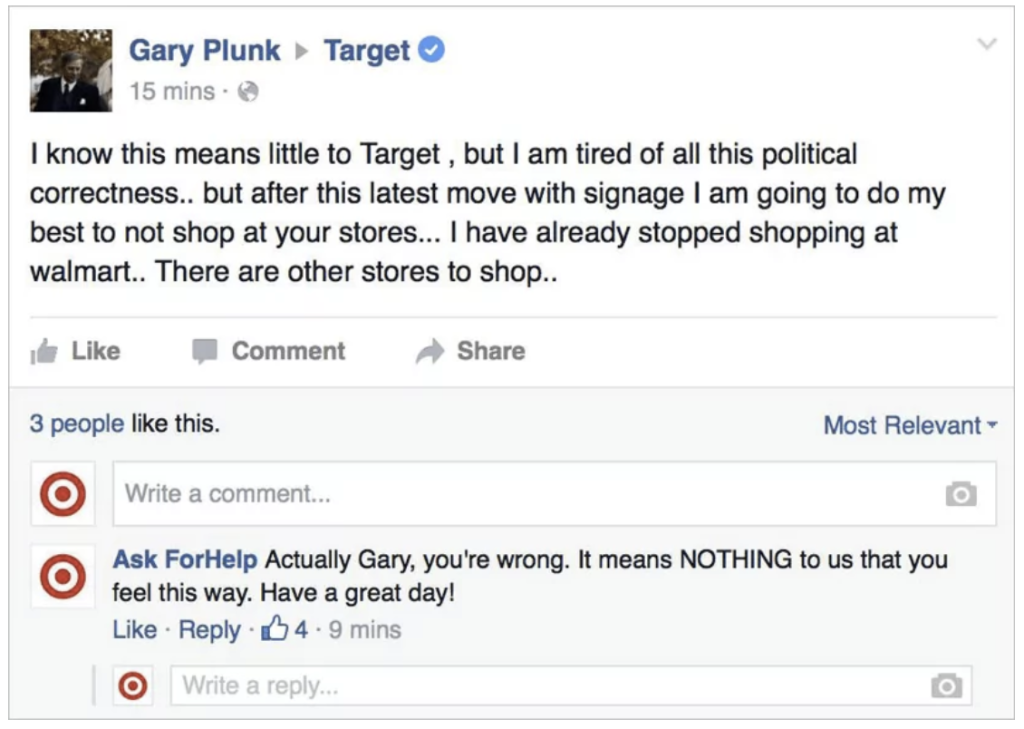Handling customer complaints is always challenging for customer support managers.
There is nothing sexy about business owners having to handle customer complaints but resolving complaints is an inevitable part of running a business. These ‘unwanted guests’ often arrive unannounced and a lot of time without mercy…
If these service complaints are not addressed correctly, they can leave a lasting stain on your brand’s reputation. But it doesn’t have to be this way. While it’s critical to focus on this aspect of your business, it doesn’t have to take up a large chunk of time or be some complex resolution.
It’s about embracing a shift in perspective and implementing effective, practical strategies. In fact, if handled right, these complaints can be transformed into golden opportunities for brand enhancement, service improvement, and the creation of deeper, stronger customer relationships.
That’s exactly what we’re going to unpack in this article. You’ll not only receive actionable tips on how to deal with customer complaints with greater efficiency but also list the general steps employees can take to handle customer complaints appropriately.
Understanding the massive impact effective complaint resolution can have on your business is the goal, so read on to find out how!
- Understanding the Nature of Customer Complaints
- The Importance of Handling a Customer Complaint
- 7 Tips to Handle Customer Complaints
- Tip 1: Always Stay Calm and Professional
- Tip 2: Practice Active Listening
- Tip 3: Apologize and Empathize
- Tip 4: Find a Suitable Solution
- Tip 5: Follow Up After Resolving the Issue
- Tip 6: Use Complaints as Learning Opportunities
- Tip 7: Implement a System for Handling Complaints
- Bonus Tips
- Discounts
- Don’t Take Things Personal
- Example of Complaint Handled Well
- Example of Complaint Handled Poorly
- The Impact of Poorly Handled Customer Complaints
- Damage to your brand’s reputation
- Loss of customer trust and loyalty
- Negative word-of-mouth publicity
- Decreased sales and revenue
- Loss of potential new customers
- The Benefits of Properly Handled Customer Complaints
- Enhanced customer loyalty
- Positive word-of-mouth referrals
- Insight into areas of improvement
- Opportunity to showcase your excellent customer service
- Increased customer lifetime value
- Key Considerations to Successfully Resolve Complaints
- Customer Compliant Software Solutions
- Conclusion
Understanding the Nature of Customer Complaints
Before we get into the tips and tricks for handling customer complaints effectively, we need to first understand the most common customer complaints companies may receive. More specifically, what they are and what they signify for your business. They should be seen as an opportunity to improve, a chance to address something that’s missing or fix a gap that needs filling.
- Product-Related Complaints: These stem from a customer’s dissatisfaction with the quality or functionality of a product. Whether it’s a toaster that doesn’t toast or a phone that doesn’t ring, the customer’s experience has been compromised, and they’ve reached out to you to rectify it.
- Service-Related Complaints: These are expressed when a customer feels the service they received was subpar. It could range from slow response times to a rude customer service agent, to unfulfilled promises. Service-related complaints can be as damaging as product-related ones because they directly affect the customer’s perception of your brand.
- Policy-Related Complaints: Sometimes, customers might express dissatisfaction with your company’s rules or procedure for handling customer complaints. These can often be harder to resolve customer issues as they may require revisiting company policies and considering if changes are needed.
By breaking down dissatisfied customer complaints into these categories, you can tailor our approach to address each one more effectively. The journey to high customer satisfaction and a more seamless customer experience starts with being able to analyze customer complaints that your business might encounter.
The Importance of Handling a Customer Complaint
Taking customer complaints lightly is just like ignoring the warning signs on a car’s dashboard; keep driving, and you might end up with a bigger problem on your hands. Poorly managed complaints can fuel negative word-of-mouth, taint your brand image, and even lead to customer attrition.
On the flip side, addressing situations when customers complain is a golden ticket to many unexpected rewards. Here’s what you stand to gain:
- Boosted Customer Loyalty: A complaint resolved promptly and efficiently can win a customer’s heart and loyalty. It sends the message that their concerns matter to you.
- Enhanced Brand Image: Handling complaints well showcases your commitment to customer satisfaction. It’s an opportunity to demonstrate your brand’s core values in action.
- Insights for Improvement: Complaints often shed light on areas that need attention. Having the right complain procedures in place can help uncover gaps in your service or product that you may have missed.
Let’s now take a look at some actional tips that you can implement today to resolve customer complaints better.
7 Tips to Handle Customer Complaints
Tip 1: Always Stay Calm and Professional
When responding to a customer complaint, it’s imperative to maintain your composure and professionalism during these interactions. Remember, your customers are upset about a situation, not you personally. Responding calmly and professionally helps defuse the situation and sets the stage for a more productive conversation where you can gain valuable insights from customer feedback.
Tip 2: Practice Active Listening
It sounds cliche but active listening is more than just hearing what your customers are saying – it’s about understanding their perspective. Reflect on their words, ask clarifying questions, and confirm your understanding. If you have access to a customer service team, each individual should be trained in active listening to ensure unhappy customers are dealt with in a professional and empathetic manner.
Tip 3: Apologize and Empathize
A sincere apology is a powerful tool for easing tensions. Coupled with empathy, it conveys that you understand and care about your customer’s feelings and frustrations. Remember, your customers are humans, not just numbers, and a touch of empathy can go a long way in humanizing your interactions. While it is definitely not an easy thing to do, sometimes you have to swallow your pride and be professional when dealing with complaints.
Tip 4: Find a Suitable Solution
Once you’ve heard and understood the complaint, it’s time to find a resolution. This doesn’t necessarily mean giving in to every demand but rather finding a balance that addresses the customer’s concerns while maintaining the company’s integrity. Offer realistic solutions, make sure the customer feels heard, and strive to exceed their expectations in the resolution.
Tip 5: Follow Up After Resolving the Issue
The resolution of a complaint is just the first step you should take as a customer service agent. You should always follow up with your customer to ensure they’re satisfied with the outcome. This not only shows them that you value their feedback but also gives you a chance to ensure that the issue has indeed been effectively resolved. Anytime you can go above and beyond when dealing with a complaint shows good faith and value to users.
Tip 6: Use Complaints as Learning Opportunities
Every customer complaint or batch of unhappy customers is a unique opportunity to improve. Analyze the issues that led to the complaint, identify trends, and find ways to prevent similar issues from arising in the future.
Remember, the goal isn’t just to put out fires – it’s to prevent them from starting in the first place. A customer complaint is simply customer feedback, even though it may not feel like it, learn from it and work to improve.
Tip 7: Implement a System for Handling Complaints
Finally, having a standardized system for handling customer complaints can significantly improve efficiency and consistency. The obvious solution is to have customer service complaint reps or customer service teams. Still, if you do not have the resources to do so you should assign or hire someone specifically to tackle customer service complaints.
Bonus Tips
Discounts
Take this with a grain of salt, but something that quiets nearly every disgruntled customer is discounts or freebies. Depending on your business model and product or service, this can be a great way to turn a bad situation into a continued customer or user.
Imagine a time when you may have complained to a company and they came back offering you a discount, extension, or free usage period. It probably made you forget all about your complaint. People love free things, and it shows that you are willing to do what it takes for a satisfied customer.
Don’t Take Things Personal
We are all human… We make mistakes, we forget things, and sometimes this affects others. Especially in business. In an age where people are used to having everything at the speed of light with perfection, as soon as this is not the case people make a fuss.
Thats ok! But what is not ok is if the customer’s complaint goes unresolved or unnoticed. So take it on the chin, show empathy, and work on improving!
With these tips in your toolbox, you should be well-equipped to transform your customer complaint handling from a stumbling block into a stepping stone. Let’s take a look at some examples of how real companies have handled customer complaints.
Example of Complaint Handled Well
Below is a great example of Best Buy’s customer service handling a situation with extreme helpfulness and over-top courtesy.
It’s clear that this customer was upset about seemingly not receiving the same promotion or benefits as other customers have. Best Buy in this situation went above and beyond in writing their response to personally handle the situation and rectify it for this customer.
Example of Complaint Handled Poorly
In response to this customer essentially mentioning that he will no longer use Target’s services, Target then responded in a way that not only was defensive but quite frankly rude. This likely eliminates any chance Targer had at keeping this customer.
While losing one customer may not be the end of the world for a large corporation, think about how this looks to others who may see this response. It probably won’t be a positive look.
Start your day
with great
quality
content
The Impact of Poorly Handled Customer Complaints
It should go without saying that handling customer complaints poorly can have cascading effects on the overall image of your company. Below are a few examples of what may happen if not properly attended to.
Damage to your brand’s reputation
When looking at how to handle customer complaints, a single one, if not handled well, can spread fast leaving a mark on your brand’s image. It’s like a small spark that can start a big fire, harming your brand more than you might think.
Loss of customer trust and loyalty
The last thing you want as a company is to burn bridges with existing customers or lose trust with potential future customers by mishandling a complaint. In any situation, the foremost goal for a business should always be to preserve and enhance the level of confidence and faithfulness their customers have toward them.
Negative word-of-mouth publicity
If a dissatisfied customer shares their negative experience with friends, family, or colleagues, this can rapidly multiply the adverse effects on your brand, possibly leading to a decrease in your customer base and potential users.
Decreased sales and revenue
When customer complaints aren’t managed effectively, you may notice a decrease in sales figures over time. Existing customers may take their business elsewhere, and prospective customers may be put off by the negative reviews they find online.
Loss of potential new customers
It’s crucial to remember that a poorly handled complaint not only affects the disgruntled customer but could also resonate negatively with your wider audience. Word of mouth and social media can quickly turn one negative response into hundreds of potential customers who likely will remember that interaction and not participate in your company’s business in the future.
The Benefits of Properly Handled Customer Complaints
On the other hand, handling customer issues adeptly can become a turning point for your business. Here are some significant benefits that can emerge from effectively resolving customer complaints:
Enhanced customer loyalty
Handling customer complaints correctly can strengthen your relationship with your customers. It shows that you value their opinions and are willing to make changes. One thing people love to do is share their opinions, good or bad. But more importantly, people just want to be heard. This can go a long way in increasing customer loyalty.
Positive word-of-mouth referrals
You’ve probably had a situation occur in the past where someone recommends a product or service to you based on their experience. Well, this can only happen if you are able to properly handle a customer complaint, and if done correctly can lead to a ripple effect of word-of-mouth referrals.
Insight into areas of improvement
Customer complaints provide valuable insight into where your business could be lacking. This feedback can guide you in making improvements and enhancing your overall product or service quality if you take the time to analyze your complaints. This can mean tracking your most common complaints or suggestions and using that to improve your product or service. Which overall only benefits your company in the long run.
Opportunity to showcase your excellent customer service
Every customer complaint is a spotlight moment – a chance to bring your brand’s dedication to customer satisfaction to center stage where every user is closely watching. Especially the users submitting the complaint. By managing complaints processes with efficiency and grace, you’re in fact telling the world that your brand is steadfast in its pursuit of customer satisfaction. Successfully turning a complaint around can often speak louder than any well-crafted marketing message ever could.
Increased customer lifetime value
The goal of almost all businesses is of course to attract new users and grow through that vertical, but more importantly, it’s about attaining customers for the long run. One loyal customer who is treated well may turn into hundreds in the future through referrals and word of mouth. So treat every complaint whether future or current with care and helpfulness.
Always bear in mind that every complaint handled well not only salvages a customer relationship but also fortifies your brand’s reputation in the eyes of the general public.
Key Considerations to Successfully Resolve Complaints
Tackling complaints successfully is an art that requires a thoughtful approach. Here, we’ll walk through some key factors that haven’t been discussed yet but are integral to shaping your complaint resolution strategy:
- Understand Your Customer’s Perspective: Step into your customers’ shoes to fully grasp their issues and their emotional state. At some point in time, you may have been the one complaining to a company.
- Fast Responsiveness: People want their issues resolved quickly and efficiently. Be swift and respond promptly as this could make a customer even more frustrated if your response is sluggish.
- Empower Your Employees: Train and empower your employees to handle complaints efficiently and independently. Or, leverage AI software to handle more customer service duties.
- Keep Your Promises: If you’ve promised a resolution or follow-up, ensure you deliver. Nothing erodes trust faster than unkept promises.
- Leverage Technology: Use customer service software and chatbot tools like ChatGPT to track, manage, and resolve complaints effectively.
Finally, remember that every customer interaction, including complaints, should align with your brand’s mission and values. Be consistent, be authentic, and let your commitment to customer satisfaction shine through every conversation.
Customer Compliant Software Solutions
Of course, it would be great for every business or company to have customer service reps to handle a customer complaint that may arise, but many companies may not have the resources or capacity to hire full-time employees.
With AI tools and intuitive software making headways in the customer service space, there are now great options for a low cost that can help companies get the boost they need when handling customer complaints. Below are some options for those that may need an extra hand when it comes to customer service and responding to customer complaints.
- Zendesk
- HappyFox
- Zoho Desk
- Fresh Desk
- Live Agent
These customer-compliant tools can be great additions to any company that is looking for a more streamlined process when it comes to customer support and handling customers’ complaints.
Conclusion
In the business world, the unexpected can often be our greatest teacher (even when it doesn’t feel like it at the time).
Trust me, no one starts their day hoping for a customer complaint, but handling them with the right approach can dramatically transform your business. Implementing these seven tips in your everyday customer service routine can work wonders in turning dissatisfied customers into loyal advocates of your brand.
People want to be heard and shown that their voices and opinion matter. But, there are always those few complaints that come along that serve no value other than to throw shade at your company.
But that is the business you signed up for. People have the right to express their opinions and give their thoughts on your product or service. The best thing that you can do is to respond accordingly as that is your rightful duty (at least it should be).
So, keep these insights handy, and let’s turn those challenges into opportunities for growth, one complaint at a time.









